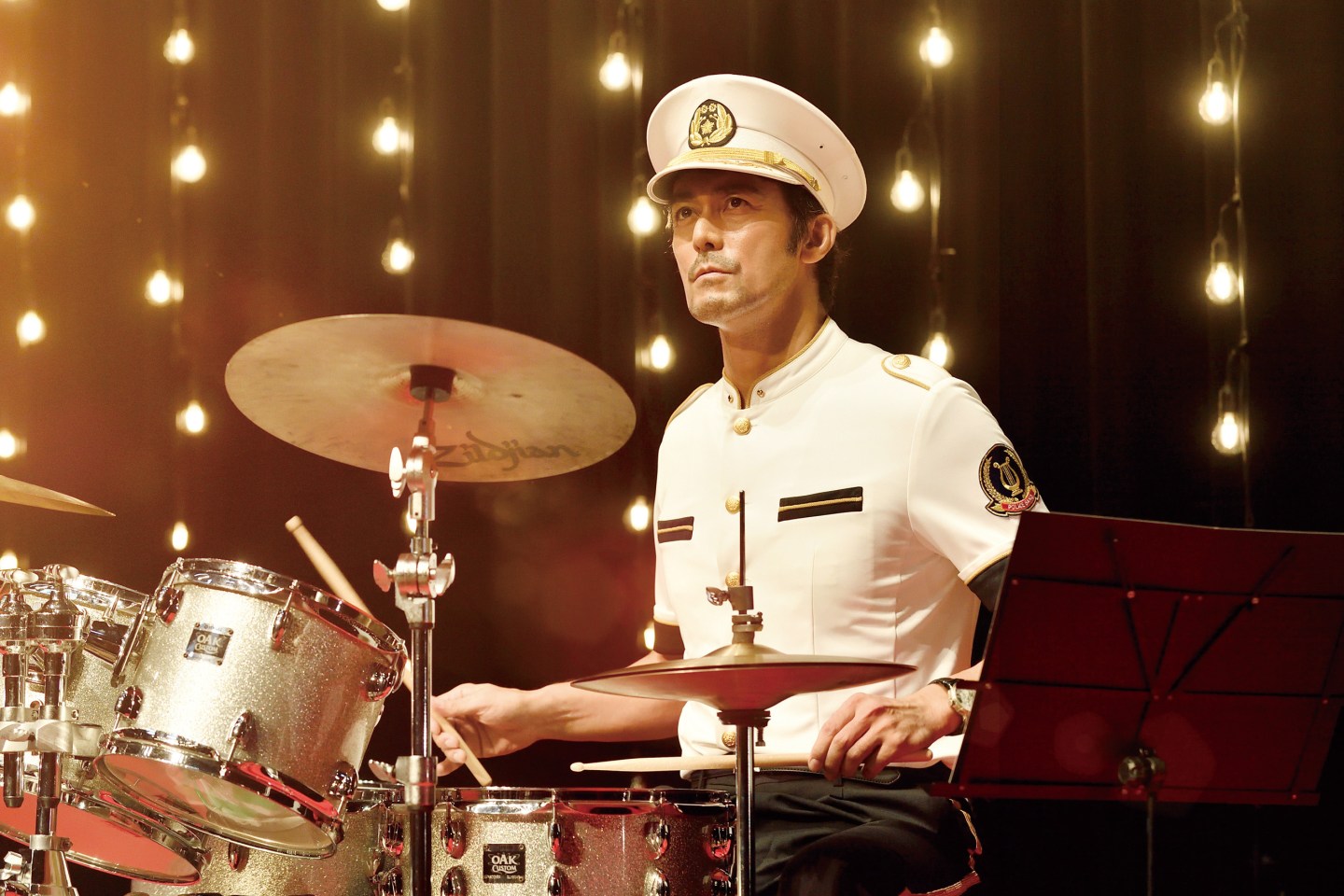
A maverick lone wolf comes to understand that it’s all about harmony after getting demoted to the police band in Eiji Uchida’s procedural dramedy, Offbeat Cops (異動辞令は音楽隊!, Ido Jirei wa Ongakutai!). Offbeat is definitely one way to describe Naruse (Hiroshi Abe) who has not only been taken off the streets but is constantly out of step not just with the times, but with his colleagues and family members too. Yet like so many in his position, he thinks it’s the world that’s wrong only later realising that creating a harmonious society is another means of effective policing.
That realisation is however hard won. An unreconstructed ‘70s cop, Naruse thinks being a detective’s all about intimidation. He reads the paper during morning briefings and ignores advice from his superiors, insisting that it’s legwork that counts in modern day policing while privately convinced that a repeat offender he failed to catch five years previously is linked to a current spate of burglaries targeting the older generation in which scammers ring up claiming to be from the crime prevention squad and convince elderly people to tell them where the valuables are before breaking in, tying them up, and robbing the place. Barging into a suspect’s home without a warrant and threatening violence, he tries to prove his theory but is soon hauled before his bosses and told there’s been a complaint about him so he’s being demoted to the police band.
One criticism he’d repeatedly received was that he had no ability to work as a team, always heading off to do his own thing rather than following the investigative line of the offer in charge. His demotion to the band is then ironic, especially as he’s being asked to play the drums, given that in order to succeed he’ll have to learn to march to the common beat. But being demoted eats away at his sense of self. If he’s not a cop then what is he and why are they making him waste his time on music when there are real bad guys out there cheating vulnerable people out of their life savings. Having divorced two years previously his relationship with teenage daughter Noriko (Ai Mikami) is already strained while he is also sole carer to his elderly mother (Mitsuko Baisho) who is suffering from dementia and keeps asking for his ex-wife and late father. He often snaps at her, cruelly reminding her of the reality rather than trying to be mindful of her constant confusion.
What he realises while playing in the band is that wading in all fists blazing is not the only way to fight crime. After encountering a cheerful old lady who enjoyed his drum playing and tells him that she looks forward to hearing the police band play, he comes to understand that people want different things from their police force and community support is just as much a part of that as chasing crooks in the street. Though he has been relegated to the band, many of his colleagues are expected to do their regular jobs too and have familial responsibilities and petty resentments of their own. Meanwhile, his former partner begins to reflect on Naruse’s dogged love of justice in his absence taking on more than a few of his characteristics in his determination to catch the criminal, realising that perhaps it’s alright to bend the rules a little if the occasion calls as long as you don’t take it too far.
Jamming with his new colleagues Naruse finally begins to realise the importance of group harmony, acknowledging his faults and apologising for them while rebuilding his relationships with friends and family. He may be wearing a different uniform, but he’s still a policeman and as long as the bad guys get caught it doesn’t matter by who. The big wigs may think the police band’s not really important, but as the banner says it helps build a bridge between the police force and the community which in turn helps prevent crime and leads to a happier, more harmonious society. Then again if you turn that around it might sound a little authoritarian in insisting that Naruse must learn to ignore the beat of his own drum to march to that of the collective while presenting an idealised view of the police’s place in the community, but it does indeed seem that he has managed to find a better accommodation with himself no longer so angry or intimidating but understanding of others and their troubles while rededicating himself to a more compassionate policing.
Offbeat Cops screened as part of this year’s New York Asian Film Festival.
International trailer (English subtitles)
Images: ©2022 “Offbeat Cops” Film Partners
